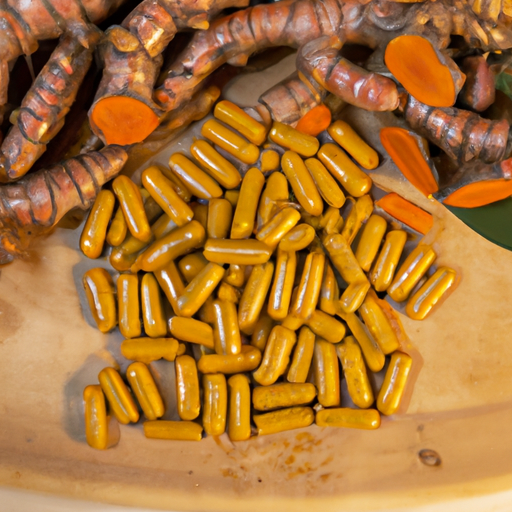Did you know that turmeric has been used for centuries in traditional medicine for its health benefits?
In fact, studies have shown that turmeric contains compounds with powerful anti-inflammatory and antioxidant properties.
On the other hand, tea is one of the most widely consumed beverages in the world, known for its potential health benefits such as improved heart health and reduced risk of chronic diseases.
Now, imagine combining these two superfoods – turmeric and tea – to create a delicious and potentially beneficial beverage.
But, is it safe to put turmeric in tea?
In this article, we will explore the health benefits of turmeric and tea individually, the potential synergistic effects of combining them, how to incorporate turmeric into your tea, as well as any possible risks or side effects.
So, let’s dive in and find out if it’s okay to put turmeric in tea!
Key Takeaways
- Turmeric has been used in traditional medicine for centuries and contains compounds with powerful anti-inflammatory and antioxidant properties.
- Combining turmeric with tea can create a delicious and potentially beneficial beverage with synergistic effects that enhance health benefits.
- Turmeric in tea may improve digestion, boost the immune system, and reduce inflammation.
- When preparing turmeric tea, it is important to use quality ingredients such as organic turmeric and high-quality tea leaves, and to avoid additives and artificial sweeteners.
The Health Benefits of Turmeric
Putting turmeric in tea can provide numerous health benefits. Turmeric is a spice that’s been used for centuries in traditional medicine and cooking. It contains a compound called curcumin, which has been shown to have powerful anti-inflammatory and antioxidant properties. Incorporating turmeric into your tea can help reduce inflammation in the body and boost your immune system.
There are many turmeric recipes available that can easily be added to your daily routine. Additionally, if you find it difficult to consume turmeric through food, there are also turmeric supplements available on the market. These supplements can be a convenient way to reap the health benefits of turmeric.
Now, let’s delve into the benefits of drinking tea and how it can complement the addition of turmeric.
The Benefits of Drinking Tea
Sipping on a warm cup of tea can be like wrapping yourself in a cozy blanket on a chilly day. It not only provides comfort but also comes with a range of health benefits.
Different types of tea, such as green, black, and herbal teas, offer unique advantages. Green tea, for example, is known for its high antioxidant content, which can help reduce the risk of chronic diseases like heart disease and cancer.
Black tea, on the other hand, contains compounds that may promote gut health and improve digestion. Antioxidants, present in all types of tea, play a crucial role in protecting our cells from damage caused by free radicals, ultimately benefiting our overall health.
This sets the stage for understanding the potential synergistic effects of turmeric and tea in the subsequent section.
The Potential Synergistic Effects of Turmeric and Tea
To maximize the health benefits you can experience, why not consider blending the power of turmeric with your favorite cup of tea? Turmeric and tea have both been praised for their individual health benefits, but when combined, they may have synergistic effects that can enhance their positive impact on our well-being. Turmeric contains a compound called curcumin, which has anti-inflammatory and antioxidant properties. Tea, on the other hand, is rich in polyphenols, which also possess antioxidant properties. When these two powerful substances are consumed together, they may work together to provide even greater health benefits. Studies have shown that the combination of turmeric and tea can potentially improve digestion, boost the immune system, and reduce inflammation. So why not give it a try and experience the potential synergistic effects for yourself? Now, let’s explore how to incorporate turmeric into your tea.
How to Incorporate Turmeric into Your Tea
When you infuse your favorite cup of tea with the vibrant and golden spice of turmeric, an enticing symphony of flavors and health benefits await.
Turmeric tea recipes are abundant and offer a variety of ways to enjoy this ancient spice. For a simple turmeric tea, add a teaspoon of ground turmeric to a cup of hot water and let it steep for a few minutes. You can enhance the flavor by adding ginger, lemon, or honey.
If you’re looking for a creamier option, turmeric latte alternatives are also popular. These typically involve adding turmeric to a mixture of milk and spices like cinnamon and nutmeg. The result is a warm and comforting beverage that can be enjoyed any time of day.
As we explore the potential risks and side effects of turmeric in tea, it’s important to be aware of the various ways to incorporate this versatile spice into your daily routine.
The Potential Risks and Side Effects of Turmeric in Tea
When considering the potential risks and side effects of incorporating turmeric into tea, there are three key points to keep in mind.
First, allergic reactions may occur in some individuals, so it’s important to be aware of any known allergies before consuming turmeric tea.
Second, turmeric may interact with certain medications, potentially affecting their effectiveness or causing adverse effects.
Lastly, high dosages of turmeric tea may pose concerns, as excessive intake could lead to gastrointestinal issues or other health complications.
Allergic reactions
Indulging in a warm cup of tea infused with turmeric might seem like a golden opportunity, but be cautious of potential allergic reactions. While turmeric is generally considered safe for consumption, some individuals may experience adverse reactions, particularly if they have a history of skin allergies.
Here are a few things to keep in mind:
-
Skin allergies: Turmeric contains a compound called curcumin, which can cause contact dermatitis in sensitive individuals. This may manifest as redness, itching, or a rash on the skin.
-
Cross-reactivity: People with allergies to ginger, bananas, or pollen may also be more prone to developing an allergic reaction to turmeric.
-
Asthma exacerbation: In rare cases, inhaling turmeric powder or its particles may trigger asthma symptoms in individuals with pre-existing asthma.
-
Anaphylaxis: Although extremely rare, severe allergic reactions such as anaphylaxis can occur after consuming turmeric.
It’s important to be aware of these potential allergic reactions when considering adding turmeric to your tea. Moving forward, let’s explore its interactions with medications.
Interactions with medications
It’s crucial to be aware of how turmeric can interact with medications. Turmeric contains compounds called curcuminoids, which have been shown to interact with certain medications. For example, turmeric may interact with blood thinners like warfarin, increasing the risk of bleeding. Additionally, turmeric may interfere with the absorption of certain medications, such as iron supplements or some antibiotics. To ensure safe consumption, it is important to consult with a healthcare professional before adding turmeric to your tea if you are taking any medications. They can provide personalized advice based on your specific medication regimen. It’s also important to note that turmeric may interact with certain foods, such as grapefruit, which can affect the way medications are metabolized. To avoid potential interactions, it’s wise to follow dosage recommendations and seek guidance from a healthcare provider. Moving on to the next section about high dosage concerns…
High dosage concerns
Taking too much turmeric can be a recipe for trouble, as excessive consumption may lead to digestive issues and potentially interfere with certain medications. Turmeric dosage is an important consideration when incorporating it into your daily routine.
While turmeric is generally safe when used in moderation, consuming large amounts can have negative effects on the body. The active compound in turmeric, called curcumin, has been shown to have anti-inflammatory and antioxidant properties. However, high doses of curcumin can cause gastrointestinal symptoms such as nausea, diarrhea, and stomach cramps.
Additionally, consuming excessive amounts of turmeric may interact with medications like blood thinners, causing potential complications. Therefore, it’s crucial to be mindful of turmeric consumption and consult with a healthcare professional before incorporating it into your daily routine.
Transitioning into the subsequent section about the importance of quality ingredients, it’s essential to consider the source and quality of the turmeric used in tea preparation.
The Importance of Quality Ingredients
When it comes to making turmeric tea, it’s crucial to prioritize the use of quality ingredients.
Firstly, I always choose organic turmeric to ensure that it’s free from pesticides and other harmful chemicals.
Additionally, selecting high-quality tea leaves enhances the overall taste and health benefits of the tea.
Lastly, I make sure to avoid additives and fillers, as they can diminish the quality and effectiveness of the turmeric tea.
Choosing organic turmeric
To enhance your tea experience, consider incorporating organic turmeric for added health benefits. Choosing organic turmeric is important because it ensures that the turmeric has been grown without the use of synthetic pesticides or fertilizers, which can be harmful to both our health and the environment.
When selecting organic turmeric, it’s essential to find reliable sources that adhere to strict organic farming practices. Look for certifications such as USDA Organic or the Non-GMO Project Verified seal to ensure that the turmeric is truly organic. Additionally, purchasing from reputable brands or local farmers markets can provide peace of mind regarding the quality and authenticity of the product.
By choosing organic turmeric, you can enjoy the full potential of its health benefits in your tea.
Moving forward, let’s explore the next section about selecting high-quality tea leaves.
Selecting high-quality tea leaves
For an enjoyable tea experience, it’s important to select high-quality tea leaves. Choosing the right brewing method and identifying different tea varieties are key factors in achieving the perfect cup of tea. When it comes to selecting tea leaves, I always look for leaves that are whole and unbroken, as they tend to have the best flavor. Additionally, I pay attention to the aroma and color of the leaves, as these can indicate their freshness and quality. It’s also worth considering the origin of the tea, as different regions produce distinct flavors. To help you understand the importance of selecting high-quality tea leaves, take a look at the table below:
| Quality Indicators | Description |
|---|---|
| Whole and unbroken leaves | Indicates freshness and better flavor |
| Vibrant color | Sign of quality and freshness |
| Pleasant aroma | Reflects the tea’s quality |
| Origin | Influences the flavor profile |
By choosing high-quality tea leaves, you can enhance your tea-drinking experience and savor the true flavors of the tea. Moving on to the next section, let’s discuss the importance of avoiding additives and fillers in your tea.
Avoiding additives and fillers
Avoiding additives and fillers in your tea is crucial for maintaining the purity and authentic flavors of the brew, ensuring a truly satisfying and genuine tea-drinking experience. Additives such as artificial sweeteners can have a negative impact on overall health. They may contribute to weight gain, increase the risk of diabetes, and even affect the gut microbiome. By avoiding these additives, you can enjoy the natural and beneficial properties of tea without any potential harm.
When it comes to adding turmeric to tea, it’s important to consider the quality of both the tea leaves and the turmeric powder. High-quality tea leaves and fresh, organic turmeric can provide additional health benefits and complement each other in terms of taste and aroma.
In the next section, we will explore the question of whether it is safe and beneficial to put turmeric in tea.
Conclusion: Is It Safe and Beneficial to Put Turmeric in Tea?
Ultimately, incorporating turmeric into your tea can provide a safe and beneficial way to enhance both the flavor and health benefits of your daily beverage. Turmeric tea recipes have gained popularity due to the numerous health benefits associated with turmeric. The active compound in turmeric, curcumin, has been shown to have anti-inflammatory and antioxidant properties. It may help reduce the risk of chronic diseases such as heart disease, cancer, and diabetes.
However, it’s important to note that curcumin’s absorption is enhanced when consumed with black pepper and fats, so adding a pinch of black pepper and a dash of coconut oil or ghee to your turmeric tea can maximize its benefits. While turmeric is generally safe to consume, excessive intake may cause digestive issues and interact with certain medications. It’s always advisable to consult with a healthcare professional before making any significant dietary changes.
Frequently Asked Questions
Can turmeric be added to any type of tea?
Turmeric can be added to various types of tea, offering a range of benefits. It boosts immunity, reduces inflammation, and aids digestion. To make turmeric tea at home, combine turmeric powder with boiling water and other desired ingredients.
What is the recommended amount of turmeric to add to tea?
The recommended turmeric dosage to add to tea is 1/2 to 1 teaspoon per cup. Turmeric has several health benefits when added to tea, including anti-inflammatory properties and potential support for digestion and immune health.
Can turmeric tea help with weight loss?
Turmeric tea can potentially assist with weight loss due to its numerous health benefits. It’s believed to aid in digestion, reduce inflammation, and boost metabolism. There are various turmeric tea recipes available that can be incorporated into a healthy diet.
Can turmeric in tea help with inflammation?
Turmeric in tea may help with inflammation. Other potential health benefits include improved digestion and reduced risk of chronic diseases. To make a delicious turmeric tea, combine turmeric powder with hot water, lemon juice, honey, and a pinch of black pepper.
Are there any specific teas that should not be combined with turmeric?
Turmeric can be mixed with herbal teas without any issues. However, it may affect the taste of different types of tea, so it’s important to consider personal preferences when combining them.
Conclusion
In conclusion, absolutely, positively, without a doubt, it isn’t just safe but incredibly beneficial to put turmeric in tea! This powerful combination creates a synergy like no other, boosting your health and well-being to new heights.
With its anti-inflammatory properties and antioxidant effects, turmeric adds an extra punch to your daily cup of tea. So go ahead, grab that turmeric and spice up your tea routine. Your body will thank you for it!










